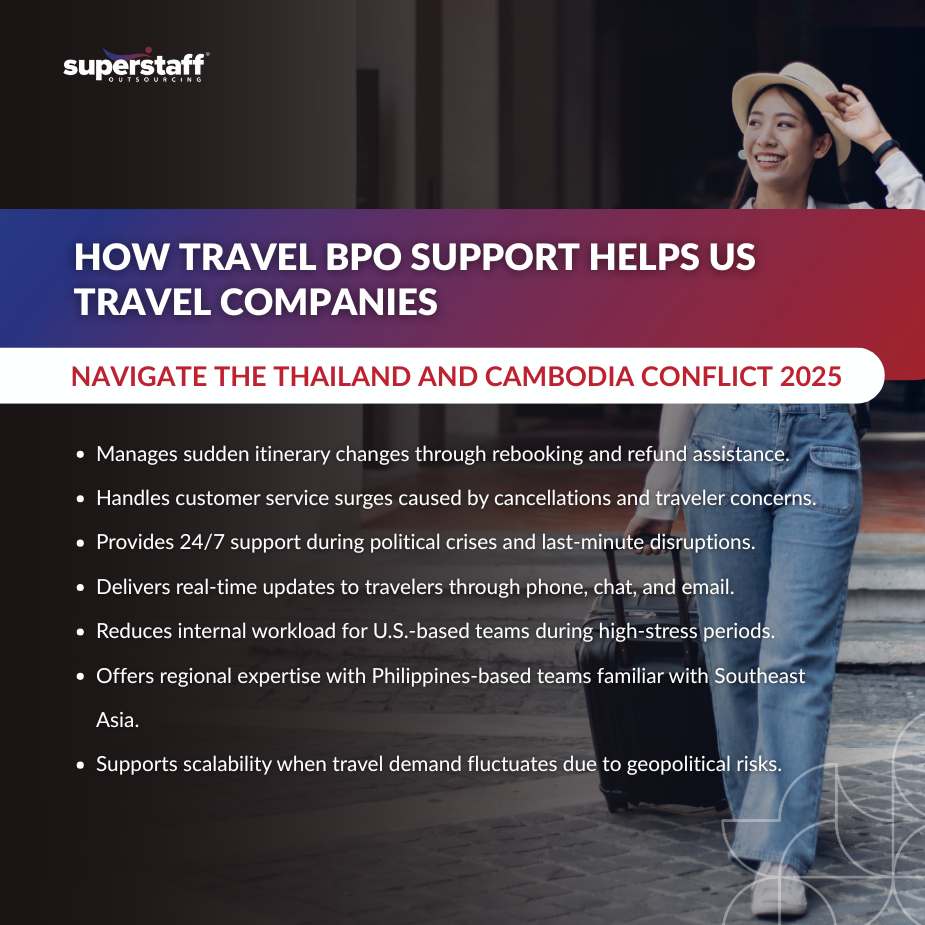
Tensions are once again simmering at the Thailand-Cambodia border, drawing global attention—and concern—from the travel industry. The Thailand and Cambodia conflict 2025 has reignited territorial disputes near the Preah Vihear Temple region, leading to heightened military presence, temporary border closures, and a surge in travel advisories from multiple countries. While the conflict remains localized, its ripple effects are already being felt across Southeast Asia’s tourism sector.
For U.S. travel companies that offer curated Southeast Asia packages, this unrest presents a complex challenge. Multi-country tours often include Thailand and Cambodia as back-to-back destinations, meaning even a minor disruption can throw off carefully planned itineraries, bookings, and customer expectations. The result? Higher call volumes, frustrated travelers, and the need for rapid itinerary changes.
This blog explores how the Thailand and Cambodia conflict 2025 impacts U.S. travel businesses and why outsourcing travel support functions can offer both stability and strategic flexibility. From handling rebookings to delivering real-time customer support, offshore travel teams can help mitigate the operational risks that come with global geopolitical uncertainty.
The Thailand-Cambodia Border Dispute Raises Immediate Red Flags for U.S. Travel Operators
The recent flare-ups near the Preah Vihear Temple have once again destabilized a region that holds significant tourism value. Armed standoffs between Thai and Cambodian troops, amplified by nationalistic rhetoric and historical grievances, have raised safety concerns not just for locals, but also for international travelers.
In response, several governments, including the U.S. State Department, have issued travel advisories cautioning tourists against visiting the affected provinces. Tour companies have begun to reroute packages, and some land borders between Thailand and Cambodia have faced temporary closures. Cultural landmarks and natural attractions that previously drove foot traffic to the region are either inaccessible or heavily restricted.
For U.S. tour operators, the implications are immediate and costly. Planned itineraries and packaged tours need last-minute revisions, resulting in disrupted schedules and increased costs. Travel businesses are also experiencing a surge in customer service volume, with travelers calling for rebooking, refunds, or safety information.
With uncertainty at the border, U.S. travel firms must rethink how to deliver support without delay.
How Political Instability in Southeast Asia Affects the U.S. Travel Industry
Southeast Asia has long been a favorite among American travelers, especially those seeking multi-country itineraries that include Thailand, Cambodia, Vietnam, and Laos. These destinations are culturally rich, cost-effective, and well-connected via overland routes and regional flights.
But the fragility of geopolitical peace in the region makes such cross-border travel vulnerable. The Thailand and Cambodia conflict 2025 illustrates how quickly unrest can derail even the best-laid plans. Political instability leads to cascading operational issues: rerouted flights, canceled hotel bookings, and delayed travel insurance processing.
These disruptions directly impact customer satisfaction. When clients experience anxiety or inconvenience, the pressure mounts on already stretched in-house travel teams in the U.S. Small to mid-sized travel agencies, in particular, struggle to manage increased customer service demands while absorbing the cost of itinerary modifications and insurance complications.
This is where strategic outsourcing partnerships come into play.
Outsourcing Travel Support: A Proven Crisis Buffer for U.S. Agencies
Outsourcing has become more than just a cost-saving measure—it’s now a resilience strategy. Offshore teams can quickly absorb increased workloads, especially during crises like the Thailand and Cambodia conflict 2025. By providing 24/7 support, they ensure U.S. travelers receive timely updates, alternative arrangements, and reassurance.
Travel support functions such as rebooking flights, canceling hotel reservations, and processing refunds can be handled efficiently by teams trained specifically for crisis management. This is where the outsourced customer service Philippines model excels. With cultural familiarity, strong English proficiency, and a deep understanding of Southeast Asian travel dynamics, Philippines-based teams offer rapid, localized responses.
The benefits are substantial: faster resolution times, multilingual assistance, and reduced burnout among in-house staff. These offshore teams can operate as an extension of U.S. agencies, maintaining brand voice while navigating complex changes.
Outsourcing isn’t just a contingency plan—it’s a competitive edge.

Top Outsourced Travel Services That Support U.S. Travel Firms During Crisis
Leading U.S. travel brands have increasingly turned to outsourcing not just for routine tasks but for high-pressure, crisis-sensitive functions. These include:
- 24/7 customer service via phone, live chat, and email for real-time updates and issue resolution.
- Travel insurance claims processing, helping travelers get reimbursed promptly amid cancellations.
- Itinerary modifications and refund assistance due to sudden border closures or transport issues.
During major global events—such as the COVID-19 outbreak, volcanic eruptions in Indonesia, or typhoons in the Pacific—outsourced teams proved essential in sustaining operations. The Thailand and Cambodia conflict 2025 fits within this pattern of unpredictable disruption.
There are even case studies where travel BPOs prevented reputational damage for U.S. firms by proactively reaching out to affected customers and offering alternatives before complaints escalated.
But not all outsourcing destinations offer the same stability during crises.
Why the Philippines and Other Stable Hubs Are Preferred for Travel Outsourcing
The Philippines stands out as a leading destination for travel industry risk mitigation outsourcing. While geopolitical tensions affect parts of Southeast Asia, the Philippines maintains a reputation for political neutrality and business continuity.
Its workforce is not only fluent in English but also familiar with Western service expectations and Southeast Asian travel patterns. Travel call center providers in the Philippines have established expertise in CX and back-office support tailored for the travel sector.
Moreover, the country’s time zone overlap with the U.S. allows for smooth coordination during emergencies. Compared to outsourcing to higher-risk zones, the Philippines offers greater assurance of uninterrupted operations.
As tensions flare in other regions, U.S. travel companies see the Philippines not only as a cost-effective choice but also a risk-averse strategic partner.
So how should U.S. travel companies build resilience for future geopolitical risks?
Building a Resilient, Agile Travel Support Model With Outsourcing
To withstand geopolitical shocks like the Thailand and Cambodia conflict 2025, travel companies must adopt agile support models. This starts with a hybrid structure: core in-house teams focusing on strategy and relationship-building, while outsourced teams handle high-volume, time-sensitive customer interactions.
Service level agreements (SLAs) and performance metrics ensure accountability during peak demand or emergency scenarios. Offshore teams can scale quickly during booking surges or sudden disruptions, keeping service quality consistent.
Training programs for offshore agents should include crisis communication protocols, destination-specific knowledge, and rebooking workflows. Additionally, outsourcing allows firms to test expansion into adjacent markets like Vietnam or Laos with minimal upfront investment—an invaluable asset in uncertain times.
With the right outsourcing partner, travel firms can manage turbulence with confidence.
Mitigate the Effects of the Thailand and Cambodia Conflict 2025 Through Strategic Travel Support Outsourcing
The Thailand and Cambodia conflict 2025 reveals how swiftly regional tensions can upend international travel operations. For U.S. tour operators, the stakes are high: disrupted schedules, increased service demands, and strained internal resources. But outsourcing offers a smart path forward.
Through travel industry risk mitigation outsourcing, firms can strengthen their operational backbone and respond more nimbly to crises. Outsourced customer service Philippines teams bring 24/7 support, regional familiarity, and scalable capacity that keep U.S. travelers informed and reassured.
Ultimately, understanding how Thailand Cambodia border dispute affects U.S. tour operators is not just about reacting—it’s about proactively building a resilient, customer-centric travel model.
Want to safeguard your travel business against global disruptions? Discover how SuperStaff’s travel support outsourcing solutions help you stay prepared, responsive, and customer-first—no matter the headlines.






